Welcome to The Apéritif! Friday Thoughts & Snacks is a weekly round up of, quite literally, my thoughts and my snacks. I use the term “weekly” in the loose and vague sense of the word.

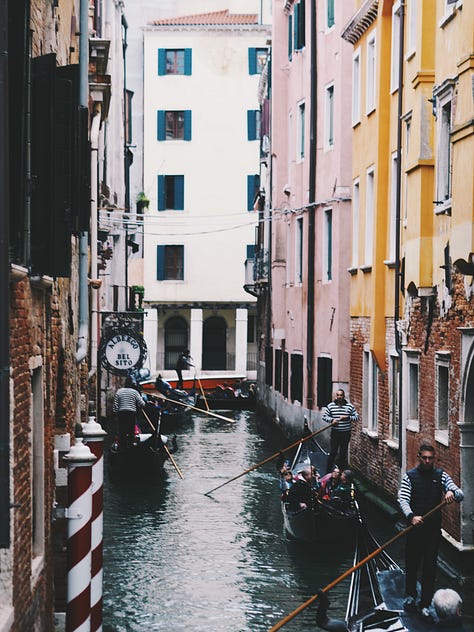
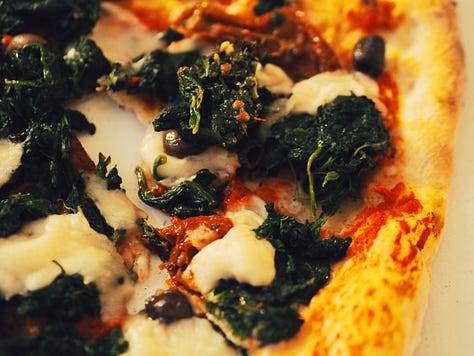
Thoughts this week: less is less is less
I begin this week from Venice, but it was not the trip I planned at all and I feel all untethered in the lagoon city. I was supposed to run the half marathon (it would have been my third half) and all the planning was oriented around that. A sprained ankle put paid to that (and indeed to all running in the near future): since the flights and hotel were paid for I came anyway, and instead I’ve been hobbling around museums and eating pizza, feeling stripped of my whole personality. I used to love travel, but these days I increasingly find airports a hassle, I’m worried about bedbugs and mosquitos, and I usually come home feeling more exhausted than when I left. Is that an age thing? Yet more untethering, yet more identity lost.
Alessandro, the lovely gregarious host of the tiny little B&B I’ve been staying in, quickly ran out of activities to recommend to me, I finished them all so fast, so instead he tells me excitedly that he’s discovered a different vegan yoghurt in the grocery store this afternoon. In my three days here, as he diligently tries to come up with interesting things to feed me at breakfast (I think he feels sorry for me, alone and hermit-like and injured and on what he sees as a strange diet to boot), I appear to have opened up to him many new and exciting parts of the supermarket he had never previously ventured into.
I remain fundamentally unconvinced about Venice, but you can read more about that on Sunday. I’m sure my own experiences of the city have tarnished it by association, too. But as I’ve been moping around basilicas and piazzos I’ve been thinking about how “less” really has a lot to recommend it. Doing less for starters: I wrote about this a bit last week but this is definitely a journey I appear to be on at the moment, this uncoupling of doing from being. Of being forced to do less and finding this at once deeply uncomfortable and mildly transformative.
Then there’s consuming less. Doing less and consuming less are, clearly, fundamentally linked, since convenience culture drives so much consumption. This week was Halloween, and I shared in a note on Sunday Gittemary Johansen’s video about the waste statistics around that (uneaten pumpkins, disposable constumes, etc). In the same way that if you have the time to drink your artisanal coffee in the coffee shop in a real ceramic mug (or make it yourself at home) you don’t need the disposable to-go cup, when any celebration or festival comes around, if you have time to DIY a costume or cook with pumpkin or make your own sweet treats you don’t need to buy (and then dispose of) those things. Very few people have that kind of spare time, but our expectations of the seasons have continued to rise in spite of that. The very existence of massly produced cheap goods places a pressure on us all to consume them.
Underconsumption was a trend for a while (although in some cases it just seemed to promote a different kind of consumption) and sustainability and minimalism have rarely been as trendy as they are now. But none of this seems to have any actual impact on the statistics when the rubber hits the road. And I think we all know this anecdotally (certainly I do): we can care about something in principle, but when the practical barriers to entry appear to be high, we cave.
We may be in the era of ‘anti-haul’ videos and #deinfluencing and #underconsumptioncore, but the OG shopping hauls are apparently making a big time comeback on TikTok all the same. Didn’t we leave that in 2008?? I’m also sensing more and more people quietly falling off the sustainability train and going back to overconsumption in other ways: Emily North wrote a great piece on fast fashion’s comeback which I think about a lot, and the trend towards purchasing seasonal decor only seems to increase year on year. I’m sure the economy plays a role too, and probably some economists could back me up on my (wholly unsubstantiated and not very well articulated theory) that it is precisely when life is at its most unaffordable and uncontrolable that we want beautiful things in our lives, and the dopamine quick-fix of purchasing them, even if that beauty is only plastic-deep.
And for those of us trying to consume less even in the face of the rising tide of convenience-driven consumption? At this point, doing less and by extension consuming less - that seemingly elusive “slow-living” idyll - feels like a pipe dream, a clutching at the aromatic vapours of a life so far out of reach. I don’t want to work more so that I can consume more: I want to work less and consume less. But for whom is that a realistic option today?
There is, however, one (and maybe only one) tool remaining in my toolbox, and one without which even with all the time and money in the world I think it would be impossible to reduce consumption, and that is this: I can train myself to want less. Fundamentally, I think it is impossible to seriously consume less, in a way that is sustainable and for the long term, if we do not learn to want less.
Clearly this is not a revolutionary statement - many people have pointed this out before me. Nor is it easy, in a world where we are bombarded daily my marketing expertly desired to exploit human psychology to create want and feed the endless compelling lie that if you just buy this one more thing, your life will be better, and you’ll finally be the person you’ve always wanted to be and have the life you’ve always wanted to have. So how do we switch if off? I’m not an expert by any means, but here’s what I’m slowly learning:
Asking: what void am I trying to fill by making this purchase? Is it truly the case that I need this item, or is there some other impulse behind it? You have to dig deep here and it can be uncomfortable. Do I just want this because I’m sad / bored / jealous of this person who has it / trying to fill the void in my life left by other unfulfilled desires? Do I subconsciously think that this will make me look prettier / higher status / insert other attribute here? This isn’t about judgment - we live in a world where people are treated differently if they look prettier / younger / wealthier, etc, and so psychologically it is wholly understandable that we try to lay claim to these attributes through our purchases, and the marketers know that. This is precisely what they are exploiting. But we have to recognise this for what it is in ourselves and understand the root cause of these feelings in order to change our habits of consumption. Without addressing the psychologic root, and tending to it with the appropriate long-term care, no change can ever be lasting.
Asking: who benefits from me making this purchase? Firstly, do I really benefit, in the medium to long term, once the dopamine hit has worn off? Is this really an item that will add value to my life for many years to come? Will it really perform the role in my life that I am subconsciously wanting it to? Secondly, what about the people who made it / sourced it / supplied it? How confident am I that they were treated fairly or remunerated adequately? What about the local community of that region, any animals involved, the impact on the earth more generally? When we really analyse these two questions, often the answer becomes very apparent: the beneficiary is neither me (the consumer) nor the producer / those impacted by production, but the corporation in between marketing it to me for profit. If the item is genuinely something I need / will benefit me, is there a way to repurpose something I already have, or at the very least to ensure my money is going to as ethical a source as possible?
Acknowledging what I already have. It’s so easy to define myself by what I don’t have by reference to other people, because of course I’m constantly exposed to social media and people around me who clearly have things I don’t. We always compare upwards; less often do I consider what I have relative to people without a home, without family, without food. Nor is it in the interest of people trying to sell me things for me to take that kind of perspective. But the bigger picture is essential. I already have a home where I’m safe, clean water, access to food and healthcare. In that context, is buying another [insert cheap mass-produced item] really going to fundamentally alter my quality of life, just because some rich influencer has it?
Cultivating a more nuanced view of beauty. An item might be aesthetically pleasing - but if it’s harming animals and underprivileged communities and the natural world, can I ever really consider it beautiful? Can I really take pride in spending my money on that and having it in my home when I know its true cost? Brands pour everything into obscuring the hidden cost of consumer goods because they don’t want consumers to make that connection - or if they do know, they don’t want them to care. And many don’t, sadly, because their view of beauty is so narrow and egocentric.
Spending time in the natural world. Linked to no.4 - developing a love and respect for the natural world has two consequences, in my experience: 1) true beauty to me is natural, now. It’s a snow-capped mountain, a woodland trail, a freshwater lake, a midwinter sunrise. It is not cheap plastic. My autumnal decor is made of a garland of autumn leaves I crocheted myself, a pumpkin that I will turn into soup at the end of the season, and conkers I collected from the Jardin des Tuileries (I’m on the lookout for some pinecones to add to my collection). I genuinely have no interest in buying cheap consumer goods because they are not attractive to me, aesthetically or morally. 2) I don’t want to contribute to the destruction or suffering of something I love.
Being mindful of who and what I allow to influence me and the content I consume. Over the years I’ve unfollowed most of the OG influencer crowd - even if I like a person’s content, if it gives me any feeling of not being ‘enough’ or of wanting to buy things I don’t need, it’s an instant unfollow. It’s not personal, I just don’t need any more voices like that in my life - that messaging is already everywhere and it’s unhelpful. I now only follow accounts on social media who inspire me towards the kind of values and life I want to be influenced towards. I’ve even muted a fair number of my own friends because, however unintentionally, something within me reacts badly to what they post, and drives me psychologically towards consumption. Again, that’s entirely about me and not about them, but what I consume matters, and life is too short for me to be more exposed than absolutely necessary to subliminal messaging that is unhelpful to me.
I do not hold myself out as a pinnacle of virtue in this area - over the coures of my life I’ve bought many things I don’t need, and I still fall prey all too often to the overconsumption trap. Even with all the above in mind, poor planning or lack of time means I still resort to the most convenient and least sustainable options at times. Indeed, I think convenience consumption is still the trap I fall into most often, because of the hours I work. But the not wanting, and the increased consciousness of why we overconsume, I think it’s a muscle that gets stronger the more it’s used. And I don’t think it’s talked about enough.
I’m home again, and happily so because I was starting to rot a little in Venice, gremlinlike. Today is All Saint’s Day, a bank holiday in France, and my apartment smells of cinnamon tea and laundry detergent. I still cannot run this weekend, which is my main stress-reliever, but I will go for gentle walks and paint candles and watch Harry Potter and catch up with friends. One of them recently sent me a message: she found some good pine cones on a recent walk in the woods, and knowing I wanted some to decorate my fireplace, carefully collected them for me.
What I’ve been cooking and eating this week

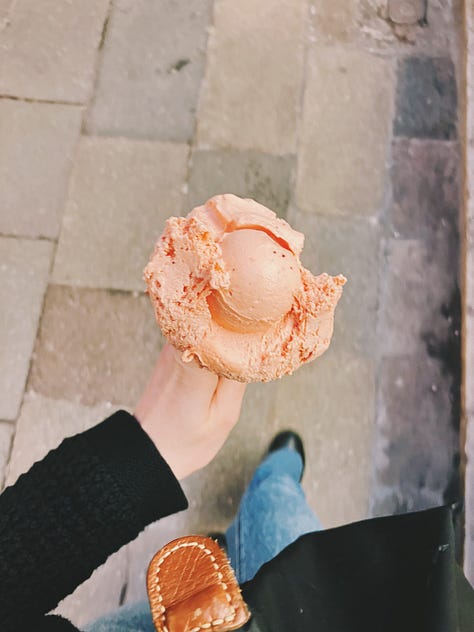
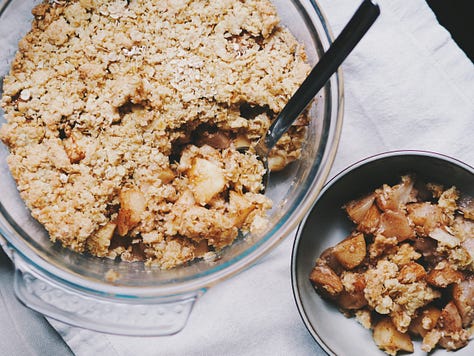
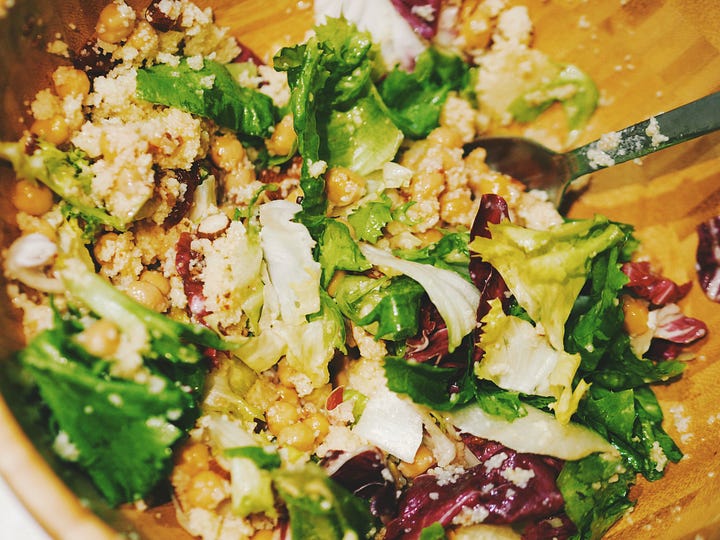
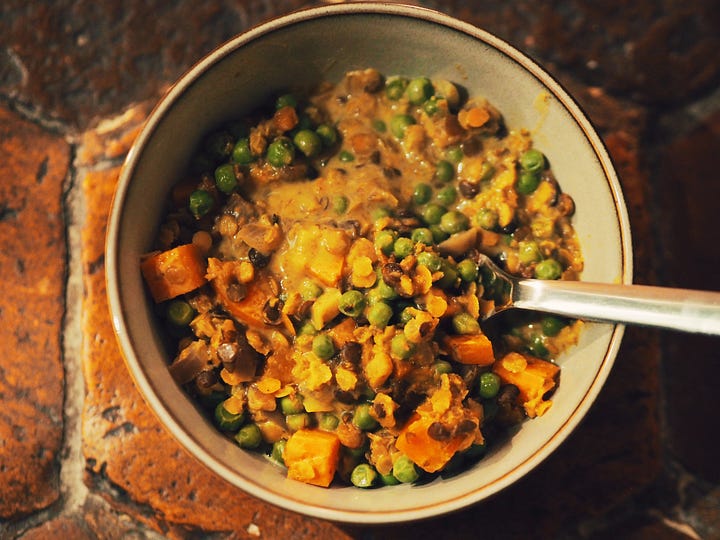
Pizza. My diet whilst in Venice involved the abovementioned breakfast excitedly prepared by Alessandro (mostly a lovely array of fruits, yoghurts, different breads with marmalades or nut butters, juice and coffee) and basically two other things: pizza, and sorbet.
Sorbet. Featured above: strawberry. Also notable: dark chocolate, and spicy grapefruit.
Apple and pear crumble. I posted the recipe for this on Tuesday! This has been a warming breakfast each morning with yoghurt through my shortened workweek.
Cous-cous, sun-dried tomato and chickpea salad. With almonds and a lemon dressing. After all my sorbet and pizza, I did really crave something a bit more nutrient-dense, and cous-cous is so quick to prepare.
A simple one-pot lentil and coconut stew. No particular recipe for this but it’s another thing I make pretty often! I sauté onion, garlic and whatever vegetables I have, then add lentils, coconut milk, tinned tomatoes and vegetable stock, and whatever spices or seasoning I feel like, and simmer until cooked. Quick, hearty, and easy to make in large batches.


I have a similar internal conflict with overconsumption. Books and clothes are my biggest issue. I am constantly clearing out my house and telling myself I will be different.
Toys for the children is an issue too, particularly around Christmas. I grew up in the 80s, where piles of presents was the norm. I am trying to break out of it, limiting my children's gifts to less and more thoughtful. But it is a challenge.
On another note, sorry to hear about your ankle! But glad you were looked after with great breakfasts in Venice!
Okay, I have a friend who decorates for holidays—she does reuse the same stuff each year—but like she loved being festive! Each year, my husband and I send jet a photo of the new location of our holiday decor (some pinecones we like picked up like five years ago). It’s a running joke that drives her crazy—but I think there is something so freeing about not decorating for holidays.